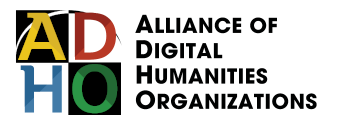L’Équipe des communications émet des recommandations sur les principales stratégies de communications de l’ADHO et gère les réseaux publics de communication de l’organisme par l’entremise du site Web de l’ADHO, des médias sociaux et des listes de distribution. L’Équipe émet aussi des recommandations pour améliorer le site Web, la présence sur les médias sociaux et la visibilité de l’ADHO en tant qu’organisation prônant l’inclusivité et la diversité.
Responsable des communications
- Communications Officer: TBD
Moniteurs·trices des communications de l’ADHO
ADHO’s Communications Fellowship is offered annually for 2 students, early career scholars, and/or practioners in digital humanities. Fellows work several hours per week to promote information shared by ADHO, its COs, Journals, and SIGs. They also take on special projects as identified by the COB and/or EB.
2023:
- Alexandra Núñez is currently a PhD candidate in German linguistics at the Technical University of Darmstadt and has a wide range of research interests. Her doctoral thesis is in the field of critical discourse analysis and focuses on the racial hygiene discourse in Germany around 1900. As part of an interdisciplinary DH team and funded by the Leibniz Institute for Research and Information in Education (DIPF), she has conducted DH research on automatic metaphor detection and classification in historical and contemporary texts. In addition to research in cognitive linguistics and digital humanities, she also conducts research in medical education and assessment research. At the German Institute for State Examinations in Medicine, Pharmacy, Dentistry and Psychotherapy (IMPP), she was a research coordinator in the Department of Psychotherapy responsible for the piloting, testing and implementation of new practical high-stakes assessments. Previously she worked as a principal research associate in the Department of Assessment and Information Technology and was responsible for several software development projects which included the use of natural language processing and medical knowledge bases. She holds a Magistra Artium (M.A.) (eq. BA+MA) degree in Art History and German Philology, is a certified AI product manager, and also works as a scientific reviewer, advisory board member and AI consultant.
- Isabel Rocío Rentería Galicia (January-April 2023)
- Damir Padieu (June 2023-June 2024) is a master’s student in Digital Humanities with a bachelor’s degree in Chinese studies. He is currently completing his master’s degree at Trier University and working as a research assistant at Trier Center for Digital Humanities. His DH research interests include network analysis, linked open data and TEI. He is passionate about open source principles and self-hosting.
2021 & 2022:
- Erdal Ayan is currently a PhD candidate in the department of English and American Studies at University of Kassel and a part-time master student in the Web Science Master Program at TH-Koeln. He is holding two bachelors (English Language and Literature and Sociology) and two masters degrees (English Language Teaching (ELT) & Computer Education and Instructional Technologies). He has got a broad research interest and/but his main focus is on data/text mining, sentiment analysis (opinion mining), topic modeling, network analysis (community detection), web development. He worked as teacher and lecturer for English before moving to Germany in 2017. He completed his voluntary internship in the Computing Centre at Philipps University Marburg between 2018 and 2019. Mr. Ayan worked as an academic assistant at Herder Institute from 2017 to 2020. He was part of REDE Project as an IT staff in Sprachatlas at Philipps University Marburg until June, 2021. He is the founder of Digital Humanities Turkey.
- Anna Sofia Lippolis is a Research Fellow at Italy’s National Research Council (CNR)’s Institute for Cognitive Sciences and Technologies (ISTC). After her BA in Philosophy, she received her MA in Digital Humanities and Digital Knowledge at the University of Bologna with a project on the quantitative analysis and visualization of authorial corrections. Her interests include cultural analytics, quantitative approaches in literature studies and semantic technologies. Before joining ADHO communications team, she took part in organising two conference cycles about the present and future of Digital Humanities, ‘Digital WHOmanities’.
2020:
- Mariana Zorkina is a PhD student at the Asien-Orient-Institut at the Zurich University. She received her MA in Asian and African Cultures at the St. Petersburg State University with a project on reflection of Daoism in Chinese literature. Currently she studies Tang dynasty « poems on things » and is applying computational methods to the study of language patterns in poetry. She is actively promoting quantitative approaches in literature studies, has introduced courses on Digital Humanities to two universities and has given several public talks on the topic. Before joining ADHO communications team, she acted as editor-in-chief in a Russian online media on Digital Humanities, ‘Sysblok’.
- Nabeel Siddiqui is an Assistant Professor of Communications at Susquehanna University. His research focuses on the digital humanities, the history of information science, communications, new media rhetoric, and science and technology studies. Currently, he is completing a manuscript entitled Byting Out the Public: Personal Computers and the Private Sphere, which analyzes the personal computer’s domestication during the 1970s and 1980s.
2017-18:
- Randa El-Khatib
- Anna-Maria Sichani
2016-17:
- S.E. Hackney
- Maribel Hidalgo Urbaneja
2015-16:
- Candice Lanius
- Pietro Santachiara
2014-15:
- Hannah Jacobs
- Jesica Jayd Lewis
